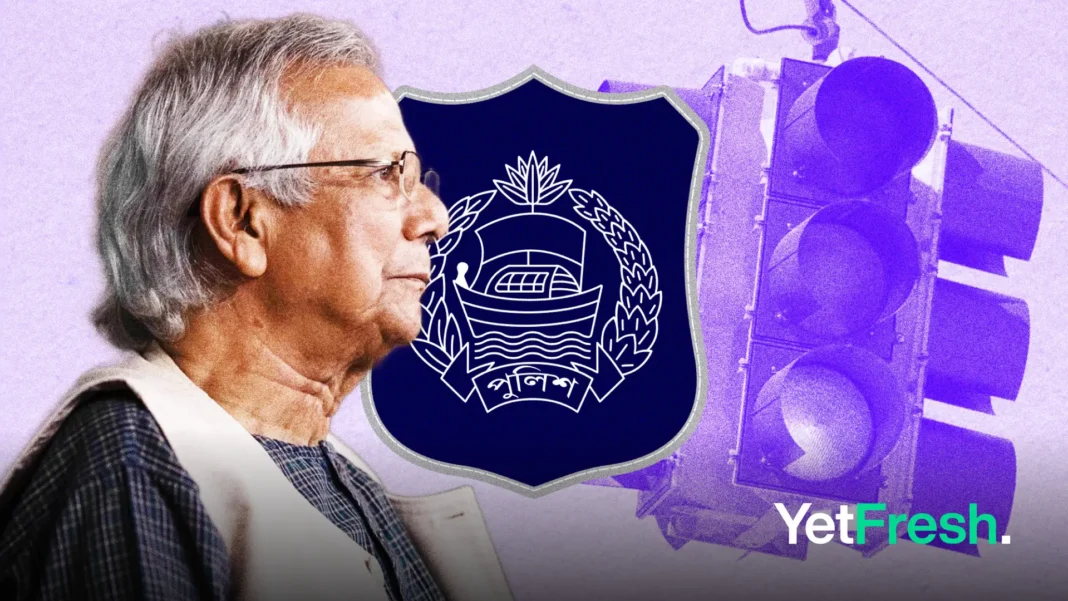No time to read? Just listen to the news!
TL;DR
- Chief Adviser Professor Muhammad Yunus has directed Dhaka Metropolitan Police and Buet experts to find immediate solutions to alleviate traffic congestion in Dhaka.
- Traffic police are tasked with implementing pilot anti-congestion schemes, including limiting bus stoppage time to under two minutes at smaller stations on key roads.
- Buet experts are asked to develop home-grown solutions for at least one traffic corridor and fix the city’s signaling system using local expertise.
- Traffic congestion in Dhaka costs Bangladesh an estimated Tk40,000 crores (approximately $4.7 billion) annually, highlighting the urgent need for effective solutions.
Chief Adviser Professor Muhammad Yunus has called for immediate action to address the severe traffic congestion plaguing Dhaka, Bangladesh’s capital city. In a meeting held on September 16, 2024, at the State Guest House Jamuna, Yunus directed top officials from the Dhaka Metropolitan Police (DMP) and experts from the Bangladesh University of Engineering and Technology (Buet) to develop and implement solutions to ease the city’s traffic woes.
“We have to ease traffic congestion. We need to find a solution immediately,” Yunus emphasized during the meeting, underscoring the urgency of the situation.
The Chief Adviser tasked the DMP with finding “quick and effective solutions” for the city’s residents. As part of this initiative, traffic police have been instructed to implement pilot anti-congestion schemes on 2-3 key roads. These measures include limiting bus stoppage time at smaller stations to less than two minutes, with plans to replicate successful strategies across other city roads.
Buet experts have been charged with developing “home-grown solutions” with the assistance of their students, focusing on at least one traffic corridor. Additionally, they have been asked to address issues with the city’s signaling system using local expertise.
Professor Moazzem Hossain of Buet, a transportation and traffic system expert, presented alarming statistics during the meeting. According to his research, traffic congestion in Dhaka alone costs the country at least Tk40,000 crores (approximately $4.7 billion) annually. This figure highlights the significant economic impact of the city’s traffic problems.
Kh Nazmul Hassan, additional commissioner (traffic) of the DMP, reported some positive developments. He noted that the traffic situation has shown improvement in recent weeks following the deployment of additional traffic police officers. Hassan stated that full deployment is expected to be completed by the end of the following week.
The meeting was attended by several key figures, including Lieutenant General (retired) Abdul Hafiz, special assistant to the chief adviser; Md Hadiuzzaman, a civil engineering professor from Buet; and Faruk Ahmed, an additional commissioner of DMP.
This initiative comes at a critical time for Dhaka, a city notorious for its traffic congestion. With over 10 million residents and a rapidly growing population, the capital has struggled with inadequate public transportation, unregulated growth of private vehicles, and insufficient road infrastructure. The average vehicle speed in Dhaka has reportedly dropped to 14 kilometers per hour, down from 21 km/h in recent years, further exacerbating the city’s mobility crisis.
The Chief Adviser’s directive represents a renewed focus on addressing one of Dhaka’s most pressing urban challenges. As the city continues to grow and evolve, the success of these initiatives could have far-reaching implications for the quality of life of its residents and the overall economic productivity of Bangladesh’s capital.
News Source: tbs




